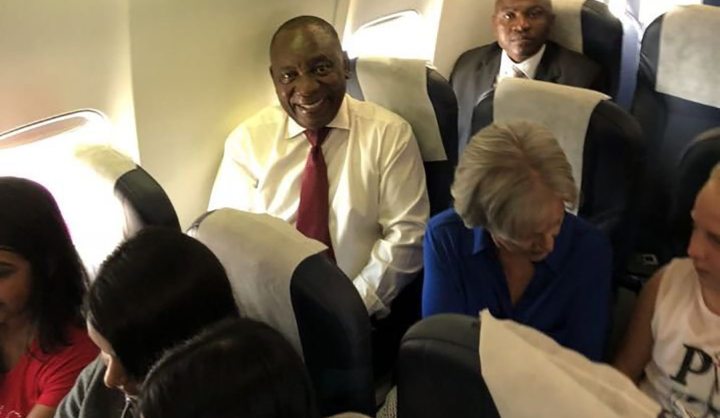South Africa
Op-Ed: Cyril Ramaphosa and the cult of the presidency

Over the weekend, pictures of President Cyril Ramaphosa flying economy on a domestic flight hit social media. While events like this help Ramaphosa craft a new image of what being the president of South African entails, the idea of the cult of the presidency helps to illustrate the shortcomings of the expectation that his “new dawn” can save South Africa. By DAVID REIERSGORD.
Over the weekend, pictures of President Cyril Ramaphosa flying economy on a domestic flight hit social media. The public’s positive reaction continues a trend of affirming Ramaphosa’s image as an ordinary South African, an image he’s been crafting since his inauguration earlier in 2018. Viewed in relation to his declaration of a “new dawn”, a cult of the presidency appears to be blossoming around Ramaphosa.
This type of media is understandably contagious after a decade of Jacob Zuma’s rare public appearances. While events like this help Ramaphosa craft a new image of what being the president of South African entails, the idea of the cult of the presidency helps to illustrate how the shortcomings of the expectation that his “new dawn” can save South Africa.
The cult of the president is an idea that refers to the American public’s expectations of what it means to be “presidential”. More colloquially, this idea is encapsulated in the awkward and unimportant question: but would you have a beer with them?
Now that information is conveyed much differently than it was even 15 years ago, due in large part to the proliferation of social media, the scope of how an American president should conduct themselves when carrying out their duties has changed.
According to Gene Healy, the cult of the presidency describes how the expectations of the president have shifted over time, from executing laws, to also acting as:
… a soul nourisher, a hope giver, a living American talisman against hurricanes, terrorism, economic downturns, and spiritual malaise. He – or she – is the one who answers the phone at 3am to keep our children safe from harm. The modern president is America’s shrink, a social worker, our very own national talk show host.
Rather than focusing on whether or not a candidate would be an effective politician, American political discourse has become focused on whether or not a politician would be an effective friend.
Healy popularised the term in his book The Cult of the Presidency. Released a decade ago, this book presciently diagnoses what’s required to be presidential in the current landscape of modern American politics. Due to the proliferation of social media, the cult of the presidency has come to suggest that Americans not only want political change, they want to feel good about it too.
Donald Trump is a perfect example of the kinds of results one gets if the desire for a president to make them feel good outweighs the desire for them to be politically competent. Lots and lots of people who voted for Trump did so because he was the opposite of what is perceived to be presidential in America – a benchmark lots and lots of people meet, which is precisely the problem with Trump’s presidency.
While Ramaphosa is not Trump, the initial success of the “new dawn” and Ramaphoria ushered in by his ascension to the top of the ANC, suggests South Africans might be looking for a presidential cult to join after the Zuma administration. Understandably, the last 10 years didn’t make many people feel good. Indeed, one could argue that the roots of this desire go back to the difficult task of the national transition 24 years ago.
When Nelson Mandela was elected in the first democratic elections in 1994, he was simultaneously tasked with righting the political trajectory of the nation, along with fostering a sense of reconciliation through feelings of goodwill, peace and unity after centuries of institutionalised white supremacy. While he did a remarkable job, the impossibility of this monumental task feeds into a critical view of Mandela that’s gained traction in recent years.
However, amid rising inequality and unemployment, along with failing schools and staggering crime rates more than two decades later, Ramaphosa’s appeals to ordinary South Africans require more scrutiny. While jogging on the streets does promote a healthy lifestyle, many South African streets aren’t safe to run through. These jogs will amount to little if communities don’t also become safer. Additionally, Ramaphosa is indeed the leader of the same ANC that only nine months ago, during a winter of Gupta-related revelations and the prospect of Nkosazana Dlamini Zuma leading the party, looked fallible.
His appeals to ordinary South Africans through flying economy, early morning walks and the promise of a “new dawn” actually speak to a specific section of South African society – the middle- and upper-classes that have the means to enjoy similar kinds of activities. The majority of South Africans don’t use airlines, opting instead for affordable – and more unsafe – minibus taxis, the accompanying violence of which we read about on planes.
The problem, though, is not that Ramaphosa wasn’t riding in a minibus taxi when he was photographed. Instead, the problem is the expectation that Ramaphosa can save the country after Zuma’s failed presidency, and using these kinds of displays as evidence.
To be fair, the renewed feeling of optimism in South Africa is a positive sign that Ramaphosa seems positioned to take advantage of. However, the cult of the presidency that seems to be growing around Ramaphosa, as a saviour that can make people feel good about change, suggests there’s little agreement about what kind of changes are needed in South Africa. DM


















 Become an Insider
Become an Insider